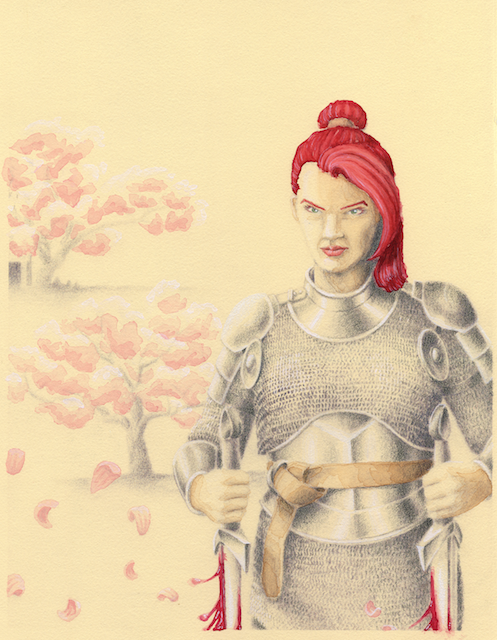Games are about Stories or How We Got Here

One thing that sometimes gets lost in discussions about gaming is that games, at least most of the games we talk about, are about story just as much, if not more so, as they are about mechanics. The stories are how we differentiate games. Otherwise, why create another point and shoot after Duck Hunt? Why have SpyHunter and Bump ‘N Jump? Why can’t Dungeons & Dragons just be the game system to rule them all?
Once you accept that the story is as important to the game system, it becomes impossible to divorce the story from the game play. I’m trying to be a bit light here, but did we not just have a war by some against 4th edition Dungeons & Dragons because some felt it relied too heavily on disassociated mechanics, that it lacked verisimilitude? If not, please let me know because that means I have truly walked through the looking glass.
Given that the story is what makes each game unique, which helps inform and contextualize the mechanics, we cannot review a game without reviewing its story. Ok, that’s a bit of an understatement. In theory you could if your only audience consists of people whose primary care is overwhelmingly about the game’s mechanics, those for whom the story, in the end, doesn’t matter.
However, there is no proof that those people constitute the majority or even the plurality of the audience. I’d argue that for the majority of the audience, story matters. This is nothing new. I’ve heard my friends discuss the stories of games for a long time, and not just in tabletop. The fact that people will attempt to criticize Anita Sarkeesian’s videos with in story rationalizations, including from fiction not included in the game, speaks to the importance of story.
That leads me to ask, what has changed? Why, today, is a game review that adds or deducts points for story so controversial? My understanding is that it’s the internet but not in the way people normally discuss it.
People blame the internet for a wide range of things. They see the toxicity and blame the ability to remain anonymous. However, I don’t think that explains what is going on here, but first I need to explain something else.
You’ve probably heard the song that claims the internet is for porn. If not, look it up, I laugh every time I hear it. The song has a fair bit of truth behind it. A lot of the advancements we enjoy today do, at least in part, come from the developers and systems engineers who kept the porn sites up. (It’s ok to laugh!)
But it hasn’t been a one-way exchange. The internet has also influenced porn. Before the internet lowered the costs of distributing porn, one common critique was that the porn being produced often focused on a limited array of body types. This can still be claimed today with which porn is most often marketed. However, when we start to look at what is being watched, a different pattern emerges. People, it turns out, have a wide range of sexual interests and people like April Flores disprove popular perceptions that heterosexual men are interested in only particular body types.
As people started analyzing web logs and releasing data that proved the wide array of interests, people started talking about how alone they had felt in their interests for a while. The data helped show that they weren’t the exception. But something else happened. People who were well served by the status quo in porn also started pushing back. They felt that these people explaining that the dominant narrative regarding what heterosexual men desired didn’t fit them were a judgment of those for whom the status quo fit their particular interests.
Consumption data can be enlightening and show that the things we believe to be true might not actually be. I think that this is happening in gaming. For a long time, a particular group held dominance over the common narrative. Those who didn’t fit that narrative kept playing, but they were invisible to the group that claimed the label as “core” for themselves. Since so little data about people who bought and loved games was available, there was no way to challenge this position. As a result, we entered a self-reinforcing cycle that isolated certain groups more and more and allowed this fiction to be seen as fact.
I’ve seen this from the actual marketing side. Most of the companies I’ve worked for have been involved in helping others do online marketing. I saw the push from just basic demographic information such as age, gender, residence, etc, to user stories where those individual pieces are used together to create more fine-grained demographic groups. It’s no longer a world of male versus female, young versus old, but middle-aged women versus teenage boys.
With that data comes the inability to continue the pretense that there is a unified core audience in gaming that constitutes the plurality of game-related revenue for game companies. The “gamer” identity, built on years of fiction, turns out to perhaps not be true.
But identity is hard and when you’ve internalized something, when it becomes not only how you see the world but something you find integral to part of who you are, well, that’s going to cause a lot of pain. That’s honestly what I see as happening and has been happening for at least as long as I’ve been writing. It’s going to keep on happening. Some people are never going to leave that denial phase. They are going to fight this for as long as they have breath. But I’ve seen minds change, not all of them, but more often than not people start to see. It just takes time.
This is why the attacks are most strong against people who don't fit the stereotype of gamer. This is why it's being called a culture war and why SJW and other terms are a common thread in the articles in favor of GamerGate. Our existence as gamers as people who are just as important to the video game makers as they are, forces them to reexamine this fiction and see where it is false. That's why women and people of color who don't challenge their narrative are welcomed while they attempt to silence others.
As to what to do, that's difficult. I fear that only time can help this, along with an attempt to speak to the true issues. But it's really hard when my own humanity is apparently on the table for negotiation and debate. So I'll continue with what I can do and have faith that the progress I've seen already will continue into the future.
Art: "Cherry Blossom Knight" © 2014 John W. Sheldon, used under a Creative Commons Attribution license: http://creativecommons.org/licenses/by/3.0/
Send feedback using the contact form or through twitter, @sarahdarkmagic.
